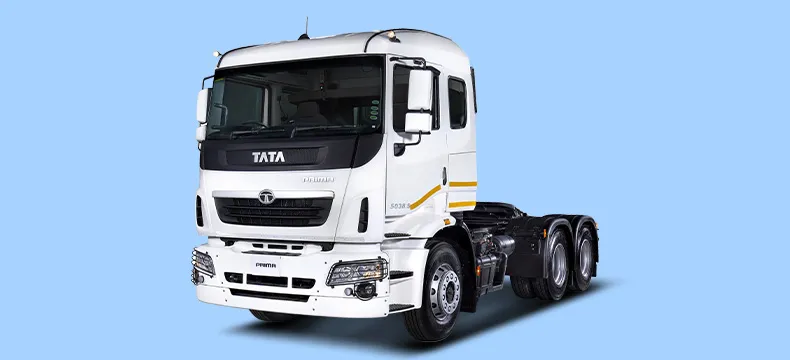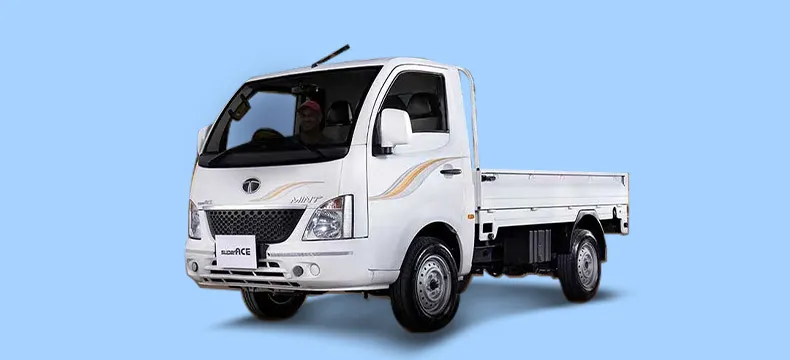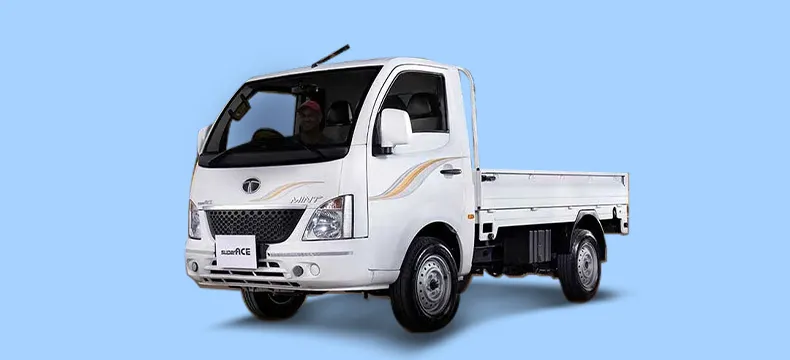5 Mar 2025

รถบรรทุกเพื่อการพาณิชย์หนัก: ภาพรวมของรถบรรทุกขนาดใหญ่สำหรับอุตสาหกรรม
- Tata Motors
- 13 Nov 2024
- Commercial Vehicle
บทนำ
ในโลกอุตสาหกรรมที่ก้าวหน้าอย่างรวดเร็ว ความสำคัญของ รถบรรทุกเพื่อการพาณิชย์หนัก นั้นไม่อาจมองข้ามได้ ตั้งแต่การขนส่งวัตถุดิบไปจนถึงการจัดส่งสินค้า รถบรรทุกขนาดใหญ่เหล่านี้เป็นกลไกสำคัญที่ขับเคลื่อนเศรษฐกิจและช่วยให้ธุรกิจดำเนินไปได้อย่างราบรื่น
บทความนี้จะพาคุณสำรวจโลกของ รถบรรทุกเพื่อการพาณิชย์หนัก ประเภทการใช้งาน และบทบาทสำคัญของพวกมันในอุตสาหกรรมที่เติบโตของประเทศไทย
I. ความสำคัญของรถบรรทุกเพื่อการพาณิชย์หนัก
รถบรรทุกเพื่อการพาณิชย์หนัก หรือที่เรียกว่า "Heavy-Duty Trucks" เป็นหัวใจสำคัญของอุตสาหกรรมขนส่ง ประกอบไปด้วยรถหลายประเภท เช่น รถหัวลาก (Tractor-Trailer), รถดัมพ์ (Dump Truck), รถผสมปูน (Cement Mixer), รถบรรทุกสินค้า (Rigid Cargo Truck) และอื่นๆ แต่ละประเภทได้รับการออกแบบมาเพื่อรองรับงานเฉพาะด้านได้อย่างมีประสิทธิภาพ
ในประเทศไทย รถบรรทุกเพื่อการพาณิชย์หนักเป็นกำลังหลักของระบบโลจิสติกส์และการขนส่ง ช่วยให้ธุรกิจสามารถดำเนินงานได้อย่างมีประสิทธิภาพในหลายภาคส่วน
II. Tata Prima 5038.S รถบรรทุกเพื่อการพาณิชย์หนัก
Tata Prima 5038.S เป็นรถหัวลากที่มาพร้อมกับ เครื่องยนต์ CUMMINS ISLe 375 ซึ่งเป็นเครื่องยนต์ดีเซลแบบระบายความร้อนด้วยน้ำ ระบบหัวฉีดตรง เทอร์โบชาร์จ และอาฟเตอร์คูล ให้กำลัง 370 แรงม้า ที่ 2,100 รอบต่อนาที และแรงบิดสูงสุด 1,550 นิวตันเมตร
ระบบส่งกำลังใช้ เกียร์ Eaton 9F + 1R ที่ช่วยให้การเปลี่ยนเกียร์เป็นไปอย่างราบรื่น พร้อมด้วย ระบบเบรกแบบ S Cam Dual-Circuit พร้อม ABS เพิ่มความปลอดภัยขณะขับขี่ในทุกสภาพถนน
ข้อมูลจำเพาะของ Tata Prima 5038.S
| รายละเอียด | ข้อมูล |
|---|---|
| รุ่น | PRIMA 5038.S |
| เครื่องยนต์ | CUMMINS ISLe 375 - ดีเซล เทอร์โบ อาฟเตอร์คูล |
| ความจุเครื่องยนต์ | 8898 cc |
| กำลังเครื่องยนต์ | 370 HP @ 2100 rpm |
| ความเร็วสูงสุด | 120 km/h |
III. การใช้งานของรถบรรทุกเพื่อการพาณิชย์หนัก
-
การขนส่งสินค้า
รถบรรทุกเพื่อการพาณิชย์หนักเป็นหัวใจหลักของโลจิสติกส์ในประเทศไทย ใช้สำหรับขนส่งสินค้า เช่น ผลิตภัณฑ์การเกษตร เครื่องใช้ไฟฟ้า และสินค้าผลิตภัณฑ์อุตสาหกรรม
-
อุตสาหกรรมก่อสร้าง
รถบรรทุก เช่น รถดัมพ์ และรถผสมปูน เป็นเครื่องมือสำคัญในการขนส่งวัสดุก่อสร้าง เช่น ทราย หิน ปูนซีเมนต์ และเหล็ก ไปยังไซต์งาน
-
การจัดการขยะ
รถเก็บขยะเป็นส่วนหนึ่งของรถบรรทุกเพื่อการพาณิชย์ รถหัวลากที่มีบทบาทสำคัญในการกำจัดขยะในเขตเมือง
-
การเกษตร
ในภาคการเกษตร รถบรรทุกขนาดใหญ่ถูกใช้เพื่อขนส่งผลผลิต ปศุสัตว์ และเครื่องจักรกลการเกษตร ทำให้สามารถกระจายสินค้าไปยังตลาดท้องถิ่นและต่างประเทศได้อย่างรวดเร็ว
IV. รถบรรทุกเพื่อการพาณิชย์หนักในประเทศไทย
-
การเติบโตทางเศรษฐกิจ
การขนส่งสินค้าภายในประเทศและการส่งออกเป็นปัจจัยสำคัญของการเติบโตทางเศรษฐกิจของไทย รถบรรทุกช่วยให้สินค้าถูกกระจายอย่างมีประสิทธิภาพ
-
การเกษตร
ภาคเกษตรกรรมของไทยต้องพึ่งพารถบรรทุกเพื่อขนส่งผลผลิตไปยังตลาดและโรงงานแปรรูป
-
การพัฒนาโครงสร้างพื้นฐาน
อุตสาหกรรมก่อสร้างที่เติบโตอย่างต่อเนื่องในประเทศไทยต้องการวัสดุก่อสร้างในปริมาณมาก ซึ่งต้องใช้รถบรรทุกดัมพ์และรถผสมปูนเป็นจำนวนมาก
-
ผลกระทบต่อสิ่งแวดล้อม
ด้วยการเติบโตทางอุตสาหกรรมของไทย ภาคขนส่งต้องเผชิญกับความท้าทายด้านสิ่งแวดล้อม แต่ปัจจุบันมีการพัฒนาเทคโนโลยีที่เป็นมิตรกับสิ่งแวดล้อมในรถบรรทุกมากขึ้น
V. นวัตกรรมและเทคโนโลยีสมัยใหม่
-
ระบบ Telematics และการเชื่อมต่อ
เทคโนโลยี Telematics ช่วยให้สามารถติดตามรถบรรทุก ตรวจสอบการบำรุงรักษา และเพิ่มความปลอดภัยในการขับขี่ ซึ่งเป็นแนวโน้มที่กำลังได้รับความนิยมมากขึ้นในอุตสาหกรรมรถบรรทุกของไทย
VI. ความท้าทายและแนวโน้มในอนาคต
แม้ว่ารถบรรทุกเพื่อการพาณิชย์หนักจะมีบทบาทสำคัญ แต่ก็ยังมีความท้าทาย เช่น ปัญหาการจราจร การพัฒนาระบบโครงสร้างพื้นฐาน และข้อกังวลด้านสิ่งแวดล้อม อย่างไรก็ตาม อุตสาหกรรมนี้กำลังพัฒนาและปรับตัวเพื่อรองรับความต้องการในอนาคต
อนาคตของรถบรรทุกเพื่อการพาณิชย์หนักในประเทศไทยดูสดใส ด้วยการพัฒนาเทคโนโลยีที่ล้ำสมัยและแนวโน้มความยั่งยืน ทำให้รถบรรทุกเหล่านี้มีแนวโน้มประหยัดพลังงาน เป็นมิตรกับสิ่งแวดล้อม และปลอดภัยยิ่งขึ้น
สรุป
รถบรรทุกเพื่อการพาณิชย์หนักในประเทศไทยเป็นกลไกสำคัญของอุตสาหกรรม ช่วยให้เกิดการเคลื่อนย้ายสินค้า สนับสนุนเศรษฐกิจ และเป็นแรงขับเคลื่อนหลักของภาคธุรกิจต่างๆ เมื่อเทคโนโลยีและความยั่งยืนเข้ามามีบทบาทมากขึ้น เราสามารถคาดหวังได้ว่ารถบรรทุกเพื่อการพาณิชย์หนักจะมีความสำคัญต่อการพัฒนาเศรษฐกิจไทยในอนาคตต่อไป
- แท็ก
- Commercial Vehicle
บล็อกล่าสุด
















